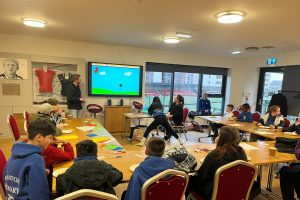It’s World Youth Skills Day!
In 2014, the United Nations General Assembly declared 15 July as World Youth Skills Day, to celebrate the strategic importance of equipping young people with skills for employment, decent work and entrepreneurship.
“Equipping young people with quality education, training and skills is essential. This World Youth Skills Day reminds us that teachers stand at the forefront of this great global effort.”
UN Secretary-General António Guterres
The theme for World Youth Skills Day 2023 is Skilling teachers, trainers and youth for a transformative future. It highlights the essential role that teachers, trainers and other educators play in providing skills for youth to transition to the labour market and to actively engage in their communities and societies.

Technological advancements and shifting labour market dynamics increasingly call for agile and adaptable skill sets. It is crucial that we empower young people to navigate these changes effectively. Technical and vocational education and training (TVET) is well placed to meet these demands by reducing access barriers to the world of work, ensuring that skills gained are relevant, recognized and certified, promoting green skills and practices, and offering skills development opportunities for youth who are not in education, employment and training.
On World Youth Skills Day, let us unite in recognizing the potential of young people as catalysts for change and commit to providing them with the skills and opportunities they need to build a prosperous and sustainable world for all. Together, we can shape a brighter future where no young person is left behind.
Why is World Youth Skills Day important?
Since 2014, World Youth Skills Day events have provided a unique opportunity for dialogue between young people, technical and vocational education and training (TVET) institutions, firms, employers’ and workers’ organizations, policy makers and development partners. Participants have highlighted the ever-increasing significance of skills as the world is embarking on a transition towards a sustainable model of development.
WHAT ROLE DO TECHNICAL AND VOCATIONAL EDUCATION AND TRAINING PLAY?
Education and training are central to the achievement of the 2030 Agenda. The vision of the Incheon Declaration: Education 2030 is fully captured by Sustainable Development Goal 4 “Ensure inclusive and equitable quality education and promote lifelong learning opportunities for all”. Education 2030 devotes considerable attention to technical and vocational skills development, specifically regarding access to affordable quality Technical and Vocational Education and Training (TVET); the acquisition of technical and vocational skills for employment, decent work and entrepreneurship; the elimination of gender disparity and ensuring access for the vulnerable. In this context, TVET is expected to address the multiple demands of an economic, social and environmental nature by helping youth and adults develop the skills they need for employment, decent work and entrepreneurship, promoting equitable, inclusive and sustainable economic growth, and supporting transitions to green economies and environmental sustainability.
TVET can equip youth with the skills required to access the world of work, including skills for self-employment. TVET can also improve responsiveness to changing skill-demands by companies and communities, increase productivity and increase wage levels. TVET can reduce access barriers to the world of work, for example through work-based learning, and ensuring that skills gained are recognised and certified. TVET can also offer skills development opportunities for low-skilled people who are under- or unemployed, out of school youth and individuals not in education, employment and training (NEETs).
- Recent estimates suggest that 600 million jobs would have to be created over the next 15 years to meet youth employment needs.
- The total global number of unemployed youths is estimated to reach 73 million in 2022, a slight improvement from 2021 (75 million) but still six million above the pre-pandemic level of 2019.
- The youth population will grow by more than 78 million between 2021 and 2030. Low income countries will account for nearly half of that increase. Education and training systems need to respond to this challenge.
- An additional 8.4 million jobs for young people could be created by 2030 through the implementation of green and blue policy measures.



